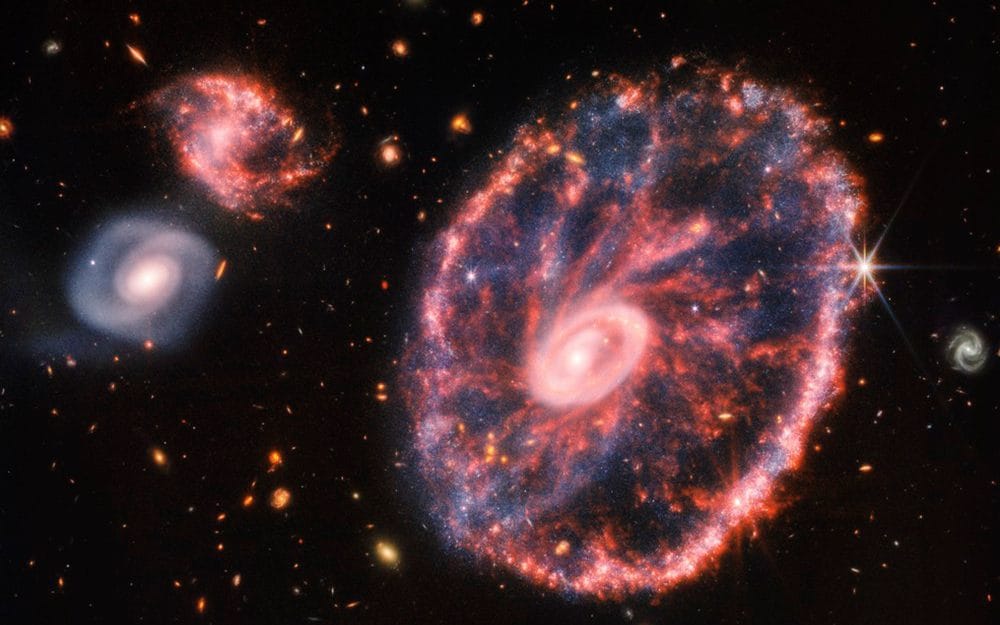"Does it make rational sense
to believe in God?"
Process theologians think so. Indeed, given the vision of the universe that is emerging from modern science, they believe it is more rational than not to believe in something like God.
Modern science gives us the image of a finely-tuned universe evolving through time, with new forms of order and novelty emerging continuously: from atoms to molecules to stars to planets and, at least on our small planet (but perhaps many more) living cells and myriad forms of life. There seems to be something like a tuning fork - a principle of order and novelty - at work in the course of things. The tuning fork does not manipulate things but it coordinates things, inspiring creaturely musicians (atoms, molecules, stars, galaxies) to play their music together and to explore new kinds of music. God, say process theologians, is the cosmic tuning fork or, perhaps better, the cosmic Tuner.
Process theologians believe that this way of understanding God is consonant with the best of science and in this sense quite rational. Even if a person has no religious faith, there are still good reasons to believe in the cosmic tuning fork and to embrace what Whitehead called "the secular function of God."
In the essay below, John Cobb offers a clear and complete explanation of Whitehead's understanding of God as it developed in Whitehead's career, illuminating the arguments Whitehead makes for God's existence. The essay is Chapter Four of Cobb's A Christian Natural Theology, published in Religion Online and republished with its permission. Cobb alludes to other chapters in the essay. The entire book can be found here.
Process theologians today are by no means limited to Whitehead's understanding of God, Cobb himself amplified Whitehead in several ways. I myself think that the process tradition offers at least six ways of thinking about God, many of which are inspired by Whitehead but none of which are reducible to Whitehead. See below. But Whitehead is a springboard for many of these ways. I am grateful to Whitehead, and to Cobb, for lighting the fires of theological imagination and making a strong case for philosophical theology. You will find a remarkable example of that kind of theology below.
- Jay McDaniel
Modern science gives us the image of a finely-tuned universe evolving through time, with new forms of order and novelty emerging continuously: from atoms to molecules to stars to planets and, at least on our small planet (but perhaps many more) living cells and myriad forms of life. There seems to be something like a tuning fork - a principle of order and novelty - at work in the course of things. The tuning fork does not manipulate things but it coordinates things, inspiring creaturely musicians (atoms, molecules, stars, galaxies) to play their music together and to explore new kinds of music. God, say process theologians, is the cosmic tuning fork or, perhaps better, the cosmic Tuner.
Process theologians believe that this way of understanding God is consonant with the best of science and in this sense quite rational. Even if a person has no religious faith, there are still good reasons to believe in the cosmic tuning fork and to embrace what Whitehead called "the secular function of God."
In the essay below, John Cobb offers a clear and complete explanation of Whitehead's understanding of God as it developed in Whitehead's career, illuminating the arguments Whitehead makes for God's existence. The essay is Chapter Four of Cobb's A Christian Natural Theology, published in Religion Online and republished with its permission. Cobb alludes to other chapters in the essay. The entire book can be found here.
Process theologians today are by no means limited to Whitehead's understanding of God, Cobb himself amplified Whitehead in several ways. I myself think that the process tradition offers at least six ways of thinking about God, many of which are inspired by Whitehead but none of which are reducible to Whitehead. See below. But Whitehead is a springboard for many of these ways. I am grateful to Whitehead, and to Cobb, for lighting the fires of theological imagination and making a strong case for philosophical theology. You will find a remarkable example of that kind of theology below.
- Jay McDaniel
